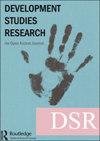Does income inequality increase the shadow economy? Empirical evidence from Uganda
Q2 Social Sciences
引用次数: 14
Abstract
ABSTRACT This paper applies the autoregressive distributed lag bounds testing method to investigate the long- and short-run relationship between the size of the shadow economy and income inequality in Uganda. The findings reveal evidence of the long and short-run relationship between the shadow economy and income inequality. We find that a rise in income inequality significantly increases the size of the shadow economy in Uganda, all else equal. These results are robust to the use of alternative econometric methods. At the policy level, instituting income redistribution policies to uplift the standard of the poor, improving resource allocation to productive sectors of the economy, reforming the tax system and macroeconomic environment, and implementing political and institutional reforms to address corruption could be viable policy options to address informality in Uganda.收入不平等加剧了影子经济吗?来自乌干达的经验证据
摘要本文应用自回归分布滞后界检验方法研究了乌干达影子经济规模与收入不平等之间的长期和短期关系。研究结果揭示了影子经济与收入不平等之间存在长期和短期关系的证据。我们发现,在其他条件相同的情况下,收入不平等的加剧显著增加了乌干达影子经济的规模。这些结果是稳健的使用替代计量经济学方法。在政策一级,制定收入再分配政策以提高穷人的标准,改善对经济生产部门的资源分配,改革税收制度和宏观经济环境,以及实施政治和体制改革以解决腐败问题,都是解决乌干达非正规问题的可行政策选择。
本文章由计算机程序翻译,如有差异,请以英文原文为准。
求助全文
约1分钟内获得全文
求助全文
来源期刊

Development Studies Research
Social Sciences-Development
CiteScore
3.20
自引率
0.00%
发文量
20
审稿时长
12 weeks
期刊介绍:
Development Studies Research ( DSR) is a Routledge journal dedicated to furthering debates in development studies. The journal provides a valuable platform for academics and practitioners to present their research on development issues to as broad an audience as possible. All DSR papers are published Open Access. This ensures that anyone, anywhere can engage with the valuable work being carried out by the myriad of academics and practitioners engaged in development research. The readership of DSR demonstrates that our goal of reaching as broad an audience as possible is being achieved. Papers are accessed by over 140 countries, some reaching over 9,000 downloads. The importance of the journal to impact is thus critical and the significance of OA to development researchers, exponential. Since its 2014 launch, the journal has examined numerous development issues from across the globe, including indigenous struggles, aid effectiveness, small-scale farming for poverty reduction, sustainable entrepreneurship, agricultural development, climate risk and the ‘resource curse’. Every paper published in DSR is an emblem of scientific rigour, having been reviewed first by members of an esteemed Editorial Board, and then by expert academics in a rigorous review process. Every paper, from the one examining a post-Millennium Development Goals environment by one of its architects (see Vandermortele 2014), to ones using established academic theory to understand development-imposed change (see Heeks and Stanforth 2015), and the more policy-oriented papers that contribute valuable recommendations to policy-makers and practitioners (see DSR Editor’s Choice: Policy), reaches a multidisciplinary audience.
 求助内容:
求助内容: 应助结果提醒方式:
应助结果提醒方式:


